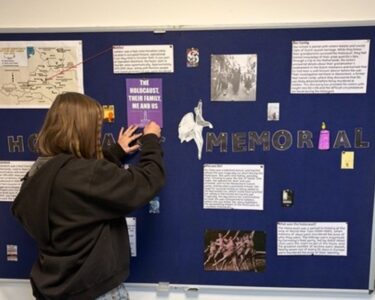75 years ago today, 22nd June 1948, more than 800 passengers disembarked from, HMT Empire Windrush, at Tilbury Dock. The story of this ship and the Windrush Generation, now so iconic in British culture and society, begins not in 1948, however, but in Hamburg in 1930.
Known as the Monte Rosa in 1930, the ship was originally a cruise ship and, on occasions, it had visited London. Repurposed for military means during the Second World War, the ship was used at one point to transport Norwegian Jews to the continental mainland, for deportation to Auschwitz-Birkenau.
One of those deported on the Monte Rosa from Oslo in November 1942, was Daniel Kaplan along with his four* sons, Jacob, Solly, Hertze and Conrad. Daniel’s journey had begun many years before his deportation and murder at the age of 72. Born in Latvia in 1870, he had migrated to Manchester, England, where his first two sons were born. Between 1881 and 1917, in part in response to violent antisemitism and pogroms, over 2 million Jewish people would leave Central and Eastern Europe in search of safety and a better life, Daniel Caplan was amongst around 200,000 others who settled in Britain. Political and public reactions to Jewish migration would contribute to the introduction of the 1905 Aliens Act, legislation designed to restrict the immigration of Jews from Eastern Europe. The Caplan family would eventually move from Manchester to Norway where they would settle in Tromsø, a city located far north in the Arctic Circle. Here they welcomed two further sons and established a family store called ‘The London Bazar’. It was from here that the men of the Caplan family were arrested and deported to their deaths on the ship Monte Rosa in 1942.
Daniel’s son Hertze was married to a non-Jewish Norwegian woman with whom he had a child. Hertze’s wife and child were not deported with him but forced to report to the police daily so that their whereabouts could be monitored. In Tromsø today there is still a store that bears the Caplan family name. In the 1960s, Anne Lise Caplan, the daughter of Hertze and the granddaughter of Daniel, opened a lingerie store in the same building that had housed Daniel’s ‘London Bazar’. Today it is run by her daughter, Inger Adele. Despite facing a backlash that saw rocks thrown through the shop window, Inger explained her decision to display the Caplan family name.
“To choose to put Caplan up at the shop is, of course, a risk. But still we must be proud of our background and that our beloved suffered and lost their life in such a horrible way to make us want to show that we are still here, and what happened to them shall never be forgotten, and that their experience has not been for nothing.”
After being seized by British forces at the end of the war the Monte Rosa was renamed the HMT Windrush in 1946. The reality for many of those who would arrive at Tilbury Docks in June 1948 was a life often marred by racism and poverty. Andrea Levy, the award-winning British author, who gained recognition following the publication of her fourth book, ‘Notes from a Small Island’ was born to Jamaican migrant parents in London in 1956. Her father arrived in Britain on the HMT Windrush in 1948, her mother arrived a year later. In her novel, ‘Notes from a Small Island’, Levy examined not just the conflict of two cultures thrown together, but also the kindness and strength that people can show to one another. Levy wished to write stories which sought not to change people’s minds but to open them:
“All my books look at what it is to be black and British, trying to make the invisible visible, and to put back into history the people who got left out – people like my Dad.”
In 2017, scandal broke out when it transpired many of the ‘Windrush generation’ had been caught in the net of tightening immigration rules introduced by the British government in 2012. This resulted in British citizens being wrongly deported, dismissed from jobs and deprived of vital services. An official report into the scandal, published in 2020 accused the UK Home Office of “institutional ignorance and thoughtlessness towards the issue of race”. In an interview with the British Library in 2018, Judy Griffith, who came to Britain as a child in 1963 from Barbados, recalls how she felt when, upon being made redundant in 2014, she had her British citizenship questioned and was told that she was an illegal immigrant.
“The thing that was so hard for me to get my head around is the sense of loss that came with it, which I’m still feeling today. I’ve just received a certificate that tells me I’m a British citizen. But it tells me I’m a British citizen from the 12th of July 2018. What’s happened to all the other years? Where have they gone?”
The difficult history of this ship raises important questions as we mark the 75th anniversary of its arrival at Tilbury docks. If we pull on the threads of the experiences of those who sailed on this ship, we see experiences of displacement, the theft of identities and the loss of homes, families, and livelihoods. And yet when we remember the individuals whose lives and their lived experiences converged in different ways, times, and places through this one ship, we also see stories of resilience, of hope and of a desire to remember and to have conservations about difficult pasts and complex histories. It prompts us to ask questions of how and why people move or are forced to move in time and space; what we remember and what we forget; and how difficult histories overlap and intersect with each other.
As we show support for #Windrush75 and mark this important anniversary, we remember and celebrate the invaluable contributions that the #WindrushGeneration have made and continue to make to British culture and society. Whilst celebrating achievements and resilience we also reflect upon the injustices that these histories highlight. We open a space to ask important and often difficult questions about the past that can and should inform our present and our future, opening minds and rewriting lost histories into the narrative of our collective memory. https://www.windrush75.org/.
(*the most recent Yad Vashem records suggest that Daniel had four sons, the article linked to here mentions 3 sons)
A blog by Helen McCord, UCL Centre for Holocaust Education



